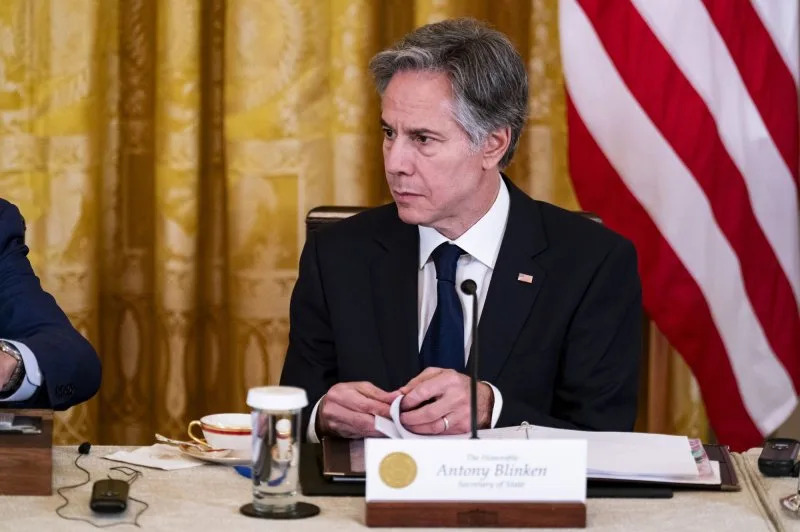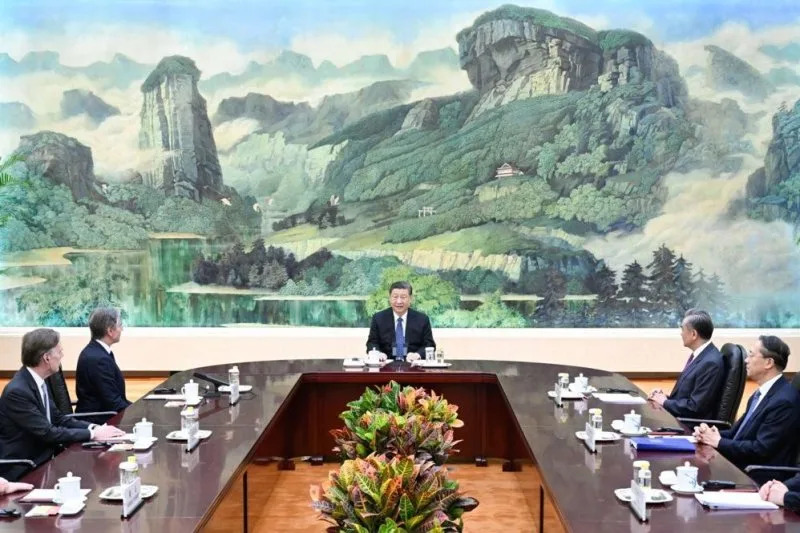Chinese President Xi Jinping (C) meets with U.S. Secretary of State Antony Blinken (2L) at the Great Hall of the People in Beijing on Friday. Blinken paid a three-day visit to China.
As Secretary of State Antony Blinken wrapped up his trip to China, a human rights group released a report calculating that China currently imprisons more than 449,000 Uyghurs in Xinjiang, about one in 17.
According to the Uyghur Human Rights Project, a Washington-based research and advocacy group, 1 in 26 Uyghurs and non-Han people in the Xinjiang Uyghur Autonomous Region in northwest China were incarcerated in 2022.
The group's analysis of leaked Chinese data, released Thursday, also estimated that 1 in 17 Uyghur adults in the region were imprisoned for actions that would be protected in a democracy, such as reading the Quran.
While the Uyghur, a minority Muslim group, and non-Han population in Xinjiang made up only 1% of China's overall population, the report indicated, the ethnic minority in the Uyghur Region account for 34% of the country's estimated prison population.
Blinken said Friday he raised concerns about "human rights abuses in Xinjiang" and other cases in his meeting with Chinese Foreign Minister Wang Yi and China's Minister of Public Security Wang Xiaohong.

However, Beijing criticized Blinken for interfering in China's domestic affairs.
"We ask the U.S. not to put fingers on domestic affairs, including those relevant to Tibet and Xinjiang," an official of the Chinese Foreign Ministry said in a statement Friday. "Do not use human rights as excuses to interfere."
China's official report on Chinese President Xi's summit with Blinken, which was published by the official Xinhua news agency, did not mention human rights.
Before Blinken's trip to China, the State Department published its 2023 Country Reports on Human Rights Practices on Monday. In the chapter that covers China, the State Department reported that genocide and crimes against humanity occurred in 2023 against Muslim Uyghurs and members of other ethnic and religious minority groups in Xinjiang.
The U.S. annual report further indicated that the conditions in penal institutions, including those for political prisoners, generally were harsh and often life-threatening or degrading.
"Prisoners often reported sleeping on the floor because there were no beds or bedding," the report said, "In many cases ventilation, heating, lighting, and access to potable water were inadequate."
Commenting on the State Department's report, Blinken said Monday that it documented "atrocities reminiscent of humanity's darkest moments" and that the United States would continue to raise deep concerns "directly with the governments responsible."
Henryk Szadziewski, the director of research at the Uyghur Human Rights Project, told Medill News Service that "the Uyghur issue has become core to U.S. human rights dialogue with China."
Szadziewski said he expected Blinken to raise human rights in a "performative" way, but he did not expect much discussion of human rights during the visit. "There are issues the China side will bring and there are issues that the U.S. side will bring -- then, there's the business."
He said the prison system benefits the Chinese economy. Some companies constructed factories near prisons to take advantage of prison labor.
"Prisoners work in those factories, and of course, the labor costs are next to none," he said.
Szadziewski said that some imprisoned Uyghurs were coerced into programs in which they are locally sourced to various factories because government incentives exist for businesses to relocate to Xinjiang.
He said as the number of imprisoned minorities had grown, so had China's forced labor pool.
"What we are seeing now is increased imprisonment, China's promotion of a narrative of stability in Xinjiang and we're seeing this continued use of coercive labor," he said.
The report also mentions several cases based on leaked documents of Uyghurs being imprisoned for reading the Quran.
In one case, Aytial Rozi studied the Quran taught it to a group of women from 2009 to 2011 and was sentenced to prison for 20 years. In another case, Ezizgul Memet studied the Quran for three days in 1976, for which she was sentenced to 10 years in prison in 2017.
Zhou Fengsuo, the executive director of Human Rights in China, said that Blinken wasn't forceful enough in raising human rights to Chinese officials. Rather than demanding action, he struck a "pleading tone, which is not that strong," Zhou said, "He is definitely not putting human rights as a priority in this trip."
The New York-based organization Human Rights in China was among the 46 groups that urged Blinken to call for the release of all political prisoners, including those in Xinjiang.
Zhou was one of the student leaders imprisoned after the protest in Tiananmen Square in Beijing in 1989. He said that the human rights situation in China became worse since then.
"The U.S. has made mistakes in the past by ignoring the human rights situation for too long," Zhou told Medill News Service.
Ma Ju, a Chinese Muslim community leader in the United States, said that what the country can do is limited. "I appreciate what the U.S. government has done for Uyghurs' human rights, but the U.S. has exhausted its efforts," Ma said.
China's oppression of the minority group has continued.
"What the Chinese regime did was oppress the minority to fulfill the majority, forming a populist rhetoric," Ma said, "Chinese President Xi Jinping used Islamophobia and social Darwinism to concrete the populism regime."
As a Muslim, Ma said that the United States' moral authority is compromised because of the high death toll of Palestinians in Gaza.
"What happened to Uyghurs and Palestinians was similar," Ma said, "I feel indignant about America's double standards between Uyghurs and Palestinians."
Canadian Ombudsperson Closes Hugo Boss Uyghur Forced Labor Probe
Ottawa’s corporate ethics watchdog has dropped its review of Hugo Boss’s Canadian arm following the withdrawal of a complaint alleging its supply chain used and benefited from Uyghur forced labor.
The move comes nearly two years after a coalition of 28 organizations, including Stop Uyghur Genocide Canada, the Uyghur Refugee Relief Fund and the Uyghur Rights Advocacy Project, accused the luxury purveyor of conducting business with Changji Esquel Textile Co., a yarn manufacturer that an Australian Strategic Policy Institute investigation linked to mass labor transfers, and Texhong Textile Group, which a Sheffield Hallam University report connected with the exploitation of Uyghurs and other Muslim minorities in China’s Xinjiang Uyghur Autonomous Region. Changji Esquel Textile Co. was later placed on both the U.S. Department of Commerce’s Entity List and the Uyghur Forced Labor Prevention Act Entity List.
The complainants said they had asked Hugo Boss Canada in December 2021 to cut off relations with Esquel and take “reasonable steps” to ensure that none of its materials are sourced in the controversial province. When the company reportedly didn’t respond, they turned to the Canadian Ombudsperson for Responsible Enterprise, better known as the CORE, with a formal complaint.
In August, the CORE opened a fact-finding probe, noting that Hugo Boss Canada did not provide a “substantive response” to the complaint. The information raised by the two reports, together with bills of lading that tied Hugo Boss with overseas subsidiaries of Esquel Group, Changi Esquel Textile Co.’s parent firm, also suggested that “there may be grounds to warrant an investigation,” it said at the time.
A spokesperson from Hugo Boss told Sourcing Journal following the CORE’s announcement that it does not source any goods that originate from Xinjiang and that the agency based its decision to investigate Hugo Boss Canada on the “incorrect fact” that it might still be ordering products from other Esquel entities outside of China. The representative also said that Hugo Boss was already winding down its relationship with Esquel in 2020 and 2021 and no longer traded with the company as of 2022.
The CORE said that executives from Hugo Boss Canada ultimately “engaged in good faith and expressed an interest in resolving the complaint” through its informal mediation services. Between November and March, all parties, including the complainants, executed a non-disclosure agreement and “engaged in direct discussions.”
On March 4, the complainants told the CORE that Hugo Boss Canada had “provided a satisfactory response or remedy” to the allegations in the complaint and wished to rescind their filing. By May 7, the CORE had closed the dispute without a formal investigation and a recommendation that Hugo Boss continue to “maintain a comprehensive approach to fulfill its responsibility” to respect human rights per the UN Guiding Principles on Business and Human Rights and the OECD Guidelines for Multinational Enterprises on Responsible Conduct.
“We are very pleased that the complaint was withdrawn as a result of our due diligence efforts,” a Hugo Boss spokesperson told Sourcing Journal. “Through an open dialogue with the complainants, we were able to showcase that Hugo Boss has implemented a comprehensive risk management system to monitor compliance with human rights throughout our value chain.”
Complaints against the Canadian branches of Guess, Levi Strauss & Co., Ralph Lauren, Nike, Diesel, Walmart and Zara, filed by the same consortium of nonprofits, remain open.
“Problem-solving through dialogue and information sharing by parties who make reasonable efforts to engage in good faith can also produce tangible results in advancing and protecting human rights,” said ombudsperson Sheri Meyerhoffer, who has spearheaded the CORE since its inception in 2019. “The CORE looks forward to helping resolve more complaints through this mutually beneficial process.”




